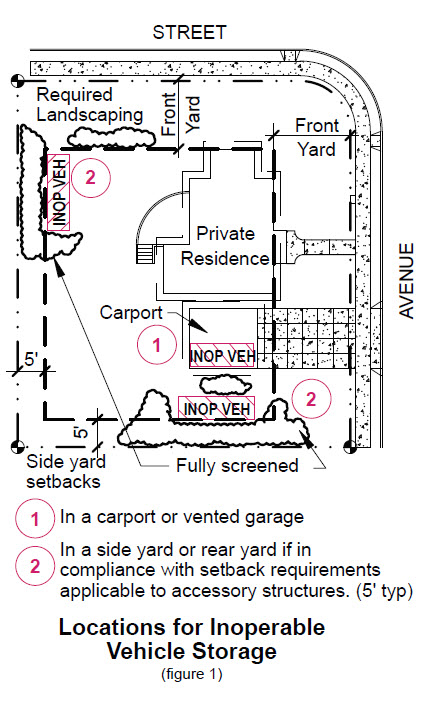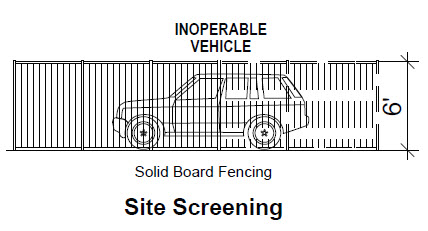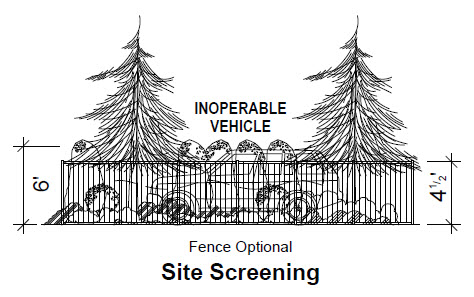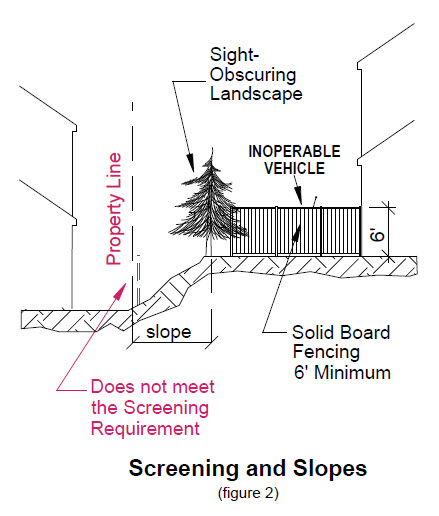
The City of Bellevue regulates the storage of inoperable motor vehicles. Inoperable motor vehicles and vehicles in various states of disrepair on residential neighborhoods must be stored in one of the following ways:
- In a vented garage
- In a carport (if open-sided, the vehicle must be screened from neighboring property and the public right of way)
- In a side or rear yard in compliance with setback requirements, which are typically five feet from the property line (the vehicle must be screened from neighboring property and the right of way)
What about my right to store my inoperable vehicle on my property?
The City Council has determined that the concern for protecting the aesthetics, integrity, vitality and property values in residential neighborhoods outweighs the interest of those desiring to store inoperable motor vehicles on residential properties unless they are properly screened.
Screening
Inoperable motor vehicles must be screened from neighboring property and the public right of way by a legally permitted solid structure or fence or by dense landscaping at least six feet in height.
Screening may consist of:
- A solid board fence, at least six feet in height
- A legally permitted solid structure
- Dense landscaping, at least six feet in height
Permitted Solid Structures
Possible structures may include a garage, house, shed, playhouse, solid walls of a carport or a guest house. Legally permitted refers to structures which meet all applicable city codes.
What if I am making repairs on my vehicle and can’t move it right away?
Open or unscreened storage of an inoperable motor vehicle is permitted for a seven-day period while the vehicle is under repair or awaiting repair.
What type of plant materials are acceptable for screening?
The following is a list of suggested plants, which, according to Sunset’s Western Garden Book, are well-foliaged from the ground up and can provide a dense screen. This list is only a suggestion for suitable plants; other plants may be used if they provide the appropriate end result. Remember that plant spacing, height at time of planting, and ongoing care and maintenance are necessary considerations when determining if the required screening is provided. Where available, both the common and Latin names are provided.
- Berberis (several types)
- Carpinus betulus (European hornbeam)
- Crataegus monogyna (Hawthorne)
- Liquidambar styraciflua (American sweet gum)
- Lonicera (several types)
- Thamnus frangula “Columnaris” (Tall buckthorn)
- Bamboo (several types)
- Calocedrus decurrens (Incense cedar)
- Damellia japonica
- Camellia sasanqua
- Chamaechparis lawsoniana (False cypress)
- Cupressocyparis leylandil
- Escallonia
- Euonymus kiautschovica Ilex (some) (Holly)
- Itea ilicifolia (Holly-leaf sweetspire)
- Juniperus (columnar types) (Juniper)
- Mahonia aquifolium (Oregon grape)
- Myrica californica (Pacific wax myrtle)
- Osmanthus heterophyllus (Holly-leaf osmanthus) Photinia
- Platycladus orientalis (Oriental arborvitae)
- Podocarpus (some)
- Prunus laurocerasus (English laurel)
- Pseudotsuga menziesii (Douglas fir)
- Pyracantha (Firethorn)
- Rhamnus alaternus (Italian buckthorn) Sequoia sempervirens (Coast redwood) Taxus (Yew)
- Teucrium (Germander)
- Thuja (Arborvitae)
- Tsuga Canadensis (Canada hemlock)
- Tsuga heterophylla (Western hemlock)
- Umbellularia californica
I would like to convert my carport to an enclosed garage to store my inoperable motor vehicle. Are building permits required?
Yes. You can apply for a building permit online at MyBuildingPermit. Contact Permit Processing for information and assistance. Hours are 8 a.m. to 4 p.m., Monday through Friday (Wednesdays, 10-4).
I would like to build a fence around my vehicle. Are there any height restrictions I should be aware of?
Yes. Learn more about fences.
I have a large residential lot. Can I charge to store other inoperable motor vehicles?
No. Parking or storage of inoperable motor vehicles for compensation is not permitted within a residential land use district.
Aside from a flat tire, my motor vehicle is operable. Do I need to screen it?
No. You need to repair the tire in order to operate your motor vehicle legally on the public roads and contact the Code Compliance officer to demonstrate that your vehicle is now operable.
I've repaired my motor vehicle to make it operable and legal to drive on public roads. I don’t plan to actually drive it on public roads at this time. Do I need a current license?
No. Motor vehicles are not required to be currently licensed to be legally stored on your property.
I received a letter from the city regarding an apparently inoperable motor vehicle on my property. The vehicle does operate although I’m not using it currently. What should I do?
Contact the Code Compliance officer upon receiving notification so you may demonstrate that your vehicle is operable.
What is the ordinance number of this regulation?
Ordinance No. 4654, which regulates the storage of inoperable motor vehicles, was adopted by the Bellevue City Council on June 6, 1994, as Section 20.20.470 of the Bellevue Land Use Code.
My neighbor has an inoperable motor vehicle that I don’t think is legal. What can I do?
To file a complaint about an inoperable motor vehicle, call Code Compliance at 425- 452-2047 or use the MyBellevue portal online.
I don’t understand some of the terms used. Please define them.
- Vehicle – A motorized conveyance that includes, but is not limited to an automobile, car, motorcycle, small watercraft, jet ski or snowmobile in operable condition.
- Inoperable Motor Vehicle – A motor vehicle which is apparently inoperable or which requires repairs in order to be operated legally on the public roads, such as repair or replacement of a window, mirror, windshield, wheel, tire, motor or transmission.
- Neighboring Property – All abutting properties.
- Public Right of Way – All public streets and property dedicated to public use for streets, together with public property reserved for public utilities, transmission lines and extensions, walkways, sidewalks, bikeways or equestrian trails.
- Type 1 Landscaping – Intended to provide a very dense sight barrier to significantly separate uses. Planting of rows of trees and/or shrubs at least six feet in height.
This information is intended to provide guidance in applying certain regulations and is for informational use only. It is not a substitute for the Bellevue City Code.



